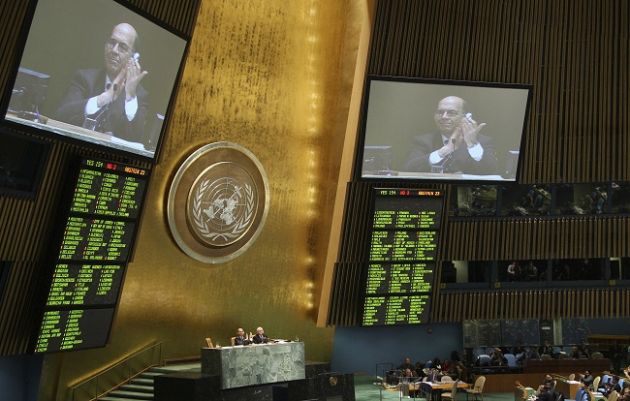Global church bodies pleased at first global arms treaty

A global church body leader has given thanks to God, nations and civil society groups, including churches, for their part in helping the United Nations adopt the world's first treaty setting rules for sale and transfer of conventional weapons such as tanks, aircraft, warships, small arms and light weapons.
The head of the World Council of Churches called a UN General Assembly vote to adopt a global Arms Trade Treaty covering conventional weapons as a milestone in controlling deadly weapons.
The World Evangelical Alliance also commended the United Nations for passing the ATT.
The treaty applies only to international trade, with each sovereign state maintaining its rights to regulate arms in its territory.
The Rev. Olav Fykse Tveit said Wednesday that the agreement the day before was long-overdue and will eventually make people's lives safer.
"We give thanks to God … and for the efforts by a large majority of countries and many civil society groups to bring it into existence," he said.
The official vote at the United Nations in New York was 154 nations in favor, with North Korea, Iran and Syria voting in opposition. Twenty three nations abstained.
"Churches in all regions share in the suffering caused by armed violence," the Rev. Tveit said. "We can all now give thanks that national authorities responsible for public safety and well-being have finally adopted binding regulations for the global arms trade.
Geoff Tunnicliffe, Secretary General of the WEA, said, "We congratulate both the United Nations and all those activists including WEA members who worked for almost a decade to get this important treaty passed."
The ATT establishes common binding standards to be applied by UN member states to all international weapons transfers, and is designed to ban arms sales for genocide, war crimes, crimes against humanity, terrorist acts and grave human rights violations.
But not all groups welcome the treaty.
Campaign Against Arms Trade described the treaty agreed at the United Nations as ineffective.
The campaign group believes the treaty will not reduce the arms trade or prevent exports to human rights violators.
The treaty may set out regulations, says CAAT, but it also says that there is a problem in that states recognise "the legitimate political, security, economic and commercial interests … in the international trade in conventional arms."
CAAT says the treaty will not stop any arms exports from the world's largest arms producing countries or arms companies. It believes that countries such as the UK, the US, France and Russia will be able to continue selling to repressive regimes.
Ann Feltham, CAAT's parliamentary coordinator in Britian, said, "This treaty legitimises the arms trade. If governments are serious about ending the trade in weaponry, with its dire consequences for peace and human rights, they should immediately stop promoting arms exports."
For his part, Tveit noted churches in 40 nations joined a WCC campaign to advocate for passing the treaty. Activity involved making contacts with local governments and conducting lobbying at UN meetings in New York and Geneva.
UN Secretary General Ban Ki-moon called the adoption a "victory for the world's people."
UN officials say the treaty asks states to consider the risk an arms transfer could facilitate violence against women and children. It also includes a prohibition on the transfer of arms that could be used to commit genocide and crimes against humanity, as well as other war crimes.
Conventional arm categories included in the treaty include battle tanks, armored combat vehicles, large-calibre artillery systems, combat aircraft, attack helicopters, warships, missiles and missile launchers, and small arms and light weapons.